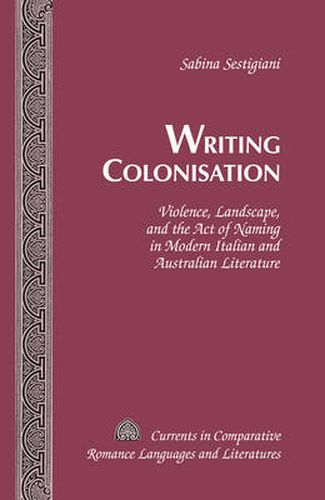Readings Newsletter
Become a Readings Member to make your shopping experience even easier.
Sign in or sign up for free!
You’re not far away from qualifying for FREE standard shipping within Australia
You’ve qualified for FREE standard shipping within Australia
The cart is loading…






This title is printed to order. This book may have been self-published. If so, we cannot guarantee the quality of the content. In the main most books will have gone through the editing process however some may not. We therefore suggest that you be aware of this before ordering this book. If in doubt check either the author or publisher’s details as we are unable to accept any returns unless they are faulty. Please contact us if you have any questions.
Writing Colonisation: Violence, Landscape, and the Act of Naming in Modern Italian and Australian Literature offers a unique comparative analysis of modern Italian and Australian literature which has never been attempted at such length and depth. The book investigates the relation between language, violence, and colonialism through comparing and contrasting selected texts in the Italian and Australian tradition (Dino Buzzati, Ennio Flaiano, Guido Ceronetti, Patrick White, David Malouf, Randolph Stow, and Barbara Baynton) and submitting them to a close analysis. The literary analysis is complemented by a critical reflection on philosophical discussions of language in continental philosophy, especially in the works of Walter Benjamin, Maurice Blanchot, and Martin Heidegger.
The book provides innovative insights into colonialism, shedding new light and ideas on the works of the authors under analysis. The book argues for a novel reading of Italian and Australian texts and employs this reading to interrogate the ways in which language has been deployed to negotiate the colonial experience - especially in relation to the interface between language and landscape - and relates this experience to Western interpretation of religious texts (e.g., Genesis), which have often been used as a justification of colonial exploitation. The book is an excellent reference for courses on comparative literature and postcolonial literature.
$9.00 standard shipping within Australia
FREE standard shipping within Australia for orders over $100.00
Express & International shipping calculated at checkout
This title is printed to order. This book may have been self-published. If so, we cannot guarantee the quality of the content. In the main most books will have gone through the editing process however some may not. We therefore suggest that you be aware of this before ordering this book. If in doubt check either the author or publisher’s details as we are unable to accept any returns unless they are faulty. Please contact us if you have any questions.
Writing Colonisation: Violence, Landscape, and the Act of Naming in Modern Italian and Australian Literature offers a unique comparative analysis of modern Italian and Australian literature which has never been attempted at such length and depth. The book investigates the relation between language, violence, and colonialism through comparing and contrasting selected texts in the Italian and Australian tradition (Dino Buzzati, Ennio Flaiano, Guido Ceronetti, Patrick White, David Malouf, Randolph Stow, and Barbara Baynton) and submitting them to a close analysis. The literary analysis is complemented by a critical reflection on philosophical discussions of language in continental philosophy, especially in the works of Walter Benjamin, Maurice Blanchot, and Martin Heidegger.
The book provides innovative insights into colonialism, shedding new light and ideas on the works of the authors under analysis. The book argues for a novel reading of Italian and Australian texts and employs this reading to interrogate the ways in which language has been deployed to negotiate the colonial experience - especially in relation to the interface between language and landscape - and relates this experience to Western interpretation of religious texts (e.g., Genesis), which have often been used as a justification of colonial exploitation. The book is an excellent reference for courses on comparative literature and postcolonial literature.